We lost an open-world Griftlands and gained a card game
The trade was worth it.
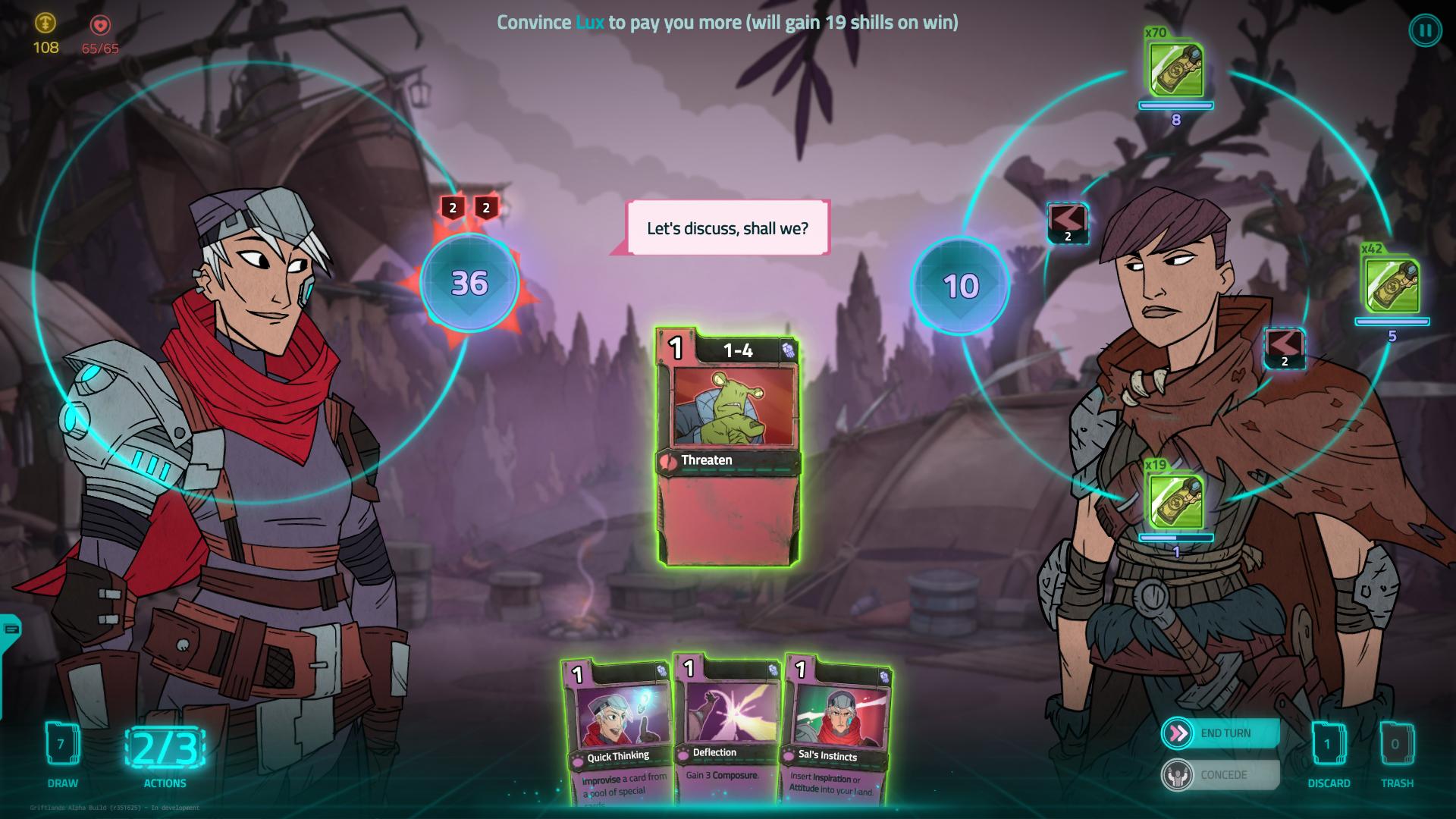
My first mistake is eating the pickled talons. My second mistake is getting drunk. Griftlands is the kind of RPG where every action has consequences. But it's also a card game, so the consequence of being drunk is having a 'slurred speech' card in my negotiation deck and a 'tipsy' card in my battle deck.
Let's back up a little. Griftlands is the new game from Klei, of Invisible Inc. and Don't Starve fame. When it was first shown during the PC Gaming Show in 2017 it looked like a neat sci-fi RPG with a comic book art style and some turn-based, Final Fantasy combat. It was going to have an open world, factions, an economy, and procedural generation.
Not long after that Klei announced they'd jumped the gun on Griftlands, and were going to retool it before they showed it again. At the PC Gaming Show two years later they brought out a Griftlands with the same aesthetic, only now it was a narrative RPG where fights and speech checks were replaced by a card game. It basically swaps the invisible dice rolls of attacks and manipulation for a hand of Slay the Spire.
The bar where nobody cares you're a slug
At a dive bar called the Grog n' Dog a friendly one-eyed slug person offers a range of jobs for bounty hunters like myself. On the city map I trundle over toward one that seems easy, a package pickup, but an encounter stops me before I get there. Another of the city's friendly slugfolk, named Rug, has a proposition. He's about to open a restaurant, and is testing his recipes on strangers.
Foolishly I choose a pickled talon from his menu and it does not agree with me. Then I've got two choices. Berate Rug, which will make me feel better but will make him like me less, or promise not to tell anyone his food made me sick, which increases his respect for me but leaves me with an ulcer—a two-point card that goes into my negotiation deck. Like a curse in Slay the Spire (or Dominion, the tabletop game that popularized deckbuilding as a format) this ulcer will hang around in the deck wasting space and reducing my odds of drawing something useful.
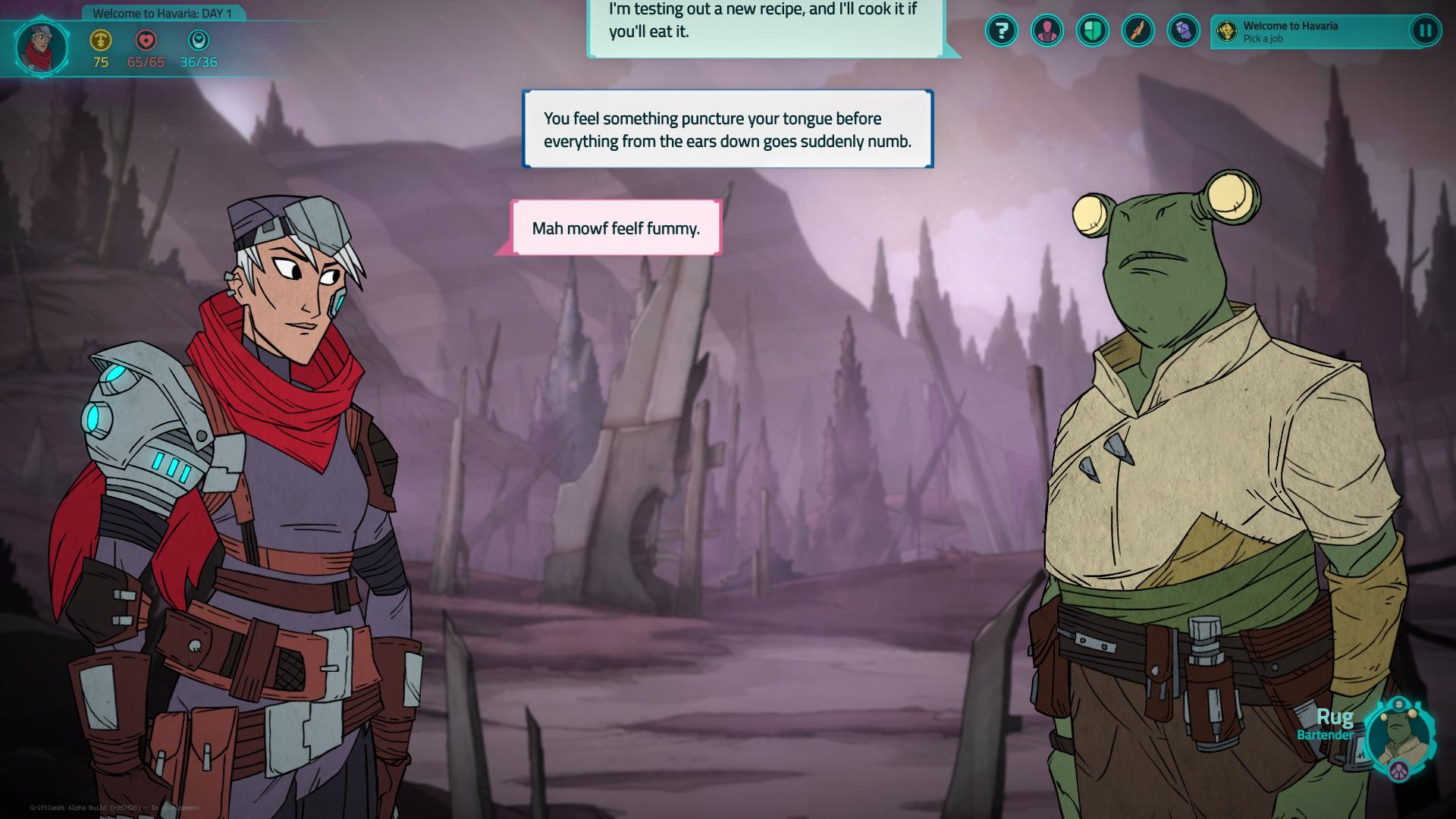
I take the ulcer because it's nice to make friends, but regret it almost immediately. The patron for the package job is a shifty bandit, and when I try to haggle with her it's time for a negotiation.
We appear opposite each other surrounded by circles that represent our arguments. In the outer circle there's a number for resolve—conversational hit points—and the bandit also has targets representing different amounts of money she'll add to my payment, each with their own resolve total. I've got a handful of cards like 'fast talk' and 'threaten' that whittle away the resolve of whatever I play them on, and deflections that reduce the severity of the wordplay she flings back. And of course, in my first hand of five cards there's that ulcer wasting a spot.
The biggest gaming news, reviews and hardware deals
Keep up to date with the most important stories and the best deals, as picked by the PC Gamer team.
I start by targeting those piles of cash, but by the time I've added 19 bucks to my payment I've also lost 10 resolve, and realized that this resolve total will carry over to the next negotiation. Meanwhile, each pile of cash I win adds to the bandit's Impatience stat, which buffs her damage. Deciding it's not worth haggling for more, I target her resolve directly to win the argument rather than drag it out.
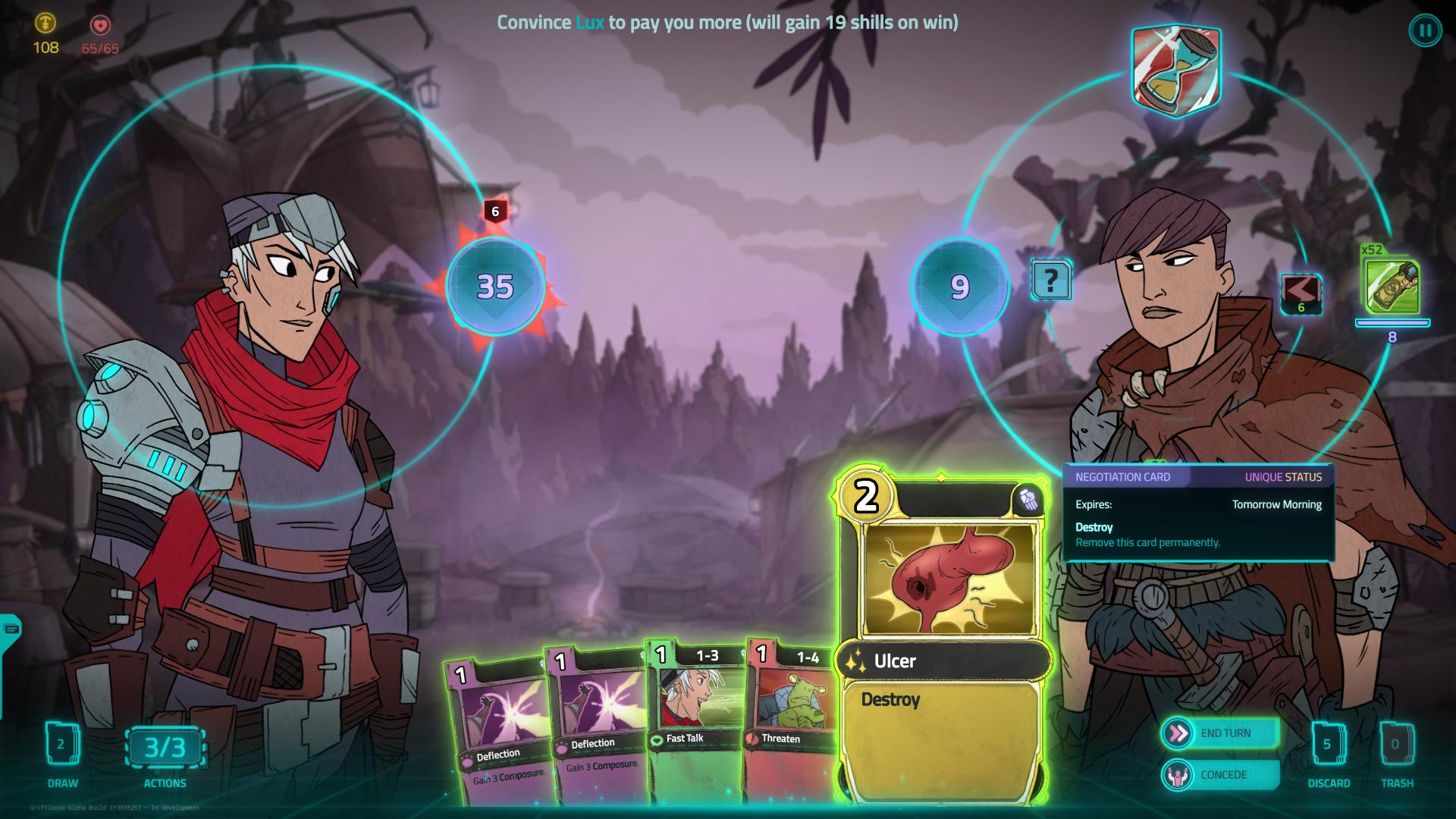
Now I'm worried about going into the next negotiation underprepared, but I did see on the map that the Grog n' Dog offers drinks to regain resolve. I duck back to the bar, share a few with a dog-headed smuggler lady (another NPC who I'm informed now likes me), and gain back all that resolve. Only now I'm low on cash, and slightly drunk.
The package I've been sent to pick up is at another bar, and it quickly becomes apparent why the bandit needed to send me. She's been barred by the dogman bartender, Wrux, for not paying her bill. Before I pick up the package I'll need to pay him off. This would be a negotiation challenge, but it's locked off. I spent too much money on booze to be able to cover her tab, and the only option left is to threaten the bartender with violence.
First, I back out of the conversation and look around the bar. Standing upstairs, lounging, is my mate Rug the slug. The chef who sold me a dodgy pickled foot is willing to sign on as a companion for a very low rate, which is all I can afford, and will fight at my side. There's also a guard by the bar who sides with Wrux the dogman, though if I had more money I could bribe him away to further improve the odds.
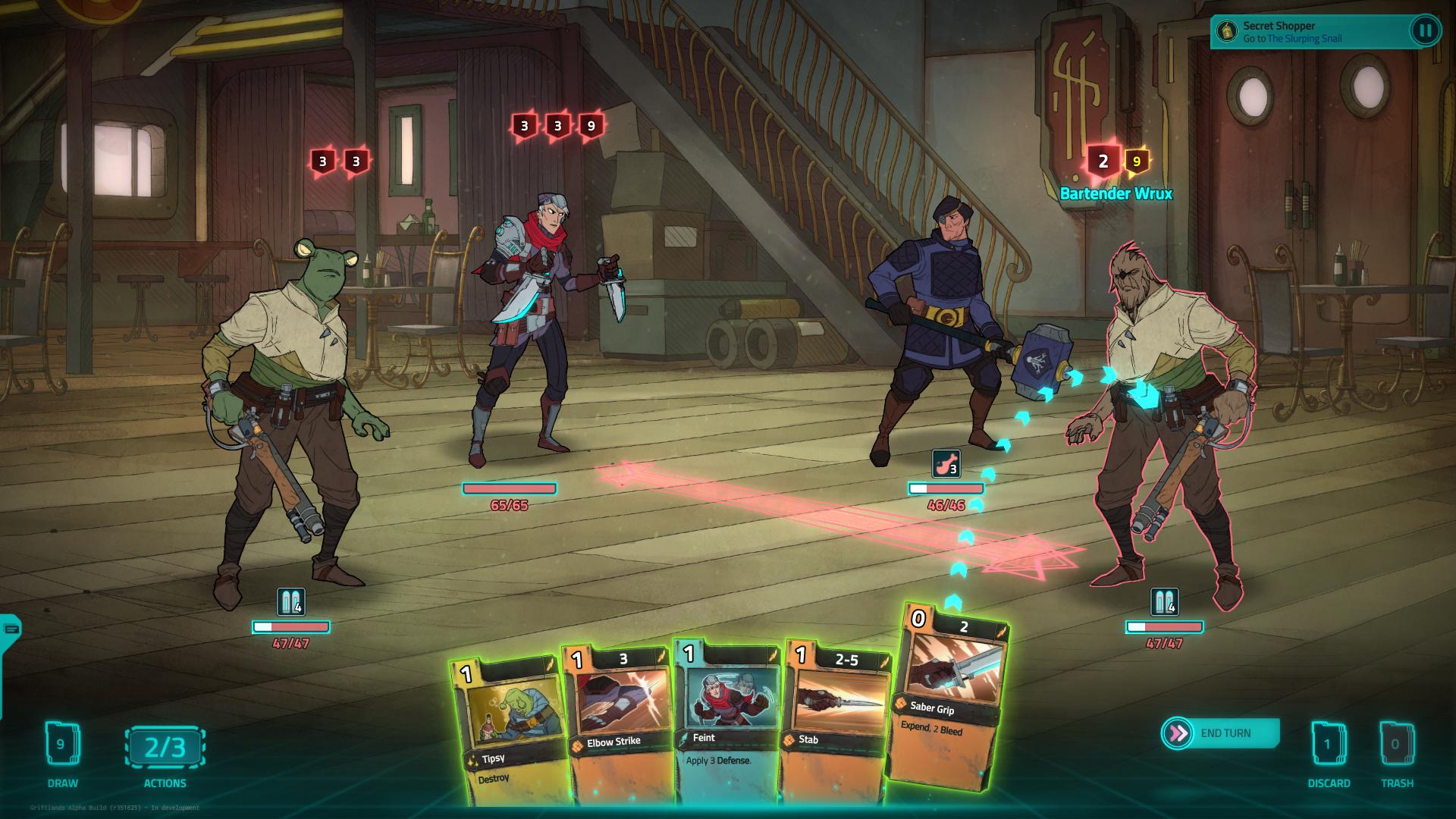
Everybody was card fu fighting
Combat plays out even more like Slay the Spire than negotiation did. I can see exactly how much damage is coming in and play defensive cards to mitigate it, but have to balance that with playing my own attack cards. The difference is I've got an ally, and while I don't control Rug he blasts away every turn before the enemies can act.
Wrux's guard has an ability that increases his damage potential so it would be sensible to target him, but Mr. Sensible and I parted ways a while back. Still, the fight goes surprisingly well. That 'tipsy' card isn't really an impediment—there's always something else to play instead. Our foes' hit points drop below the panic line that makes them surrender, and it's over.
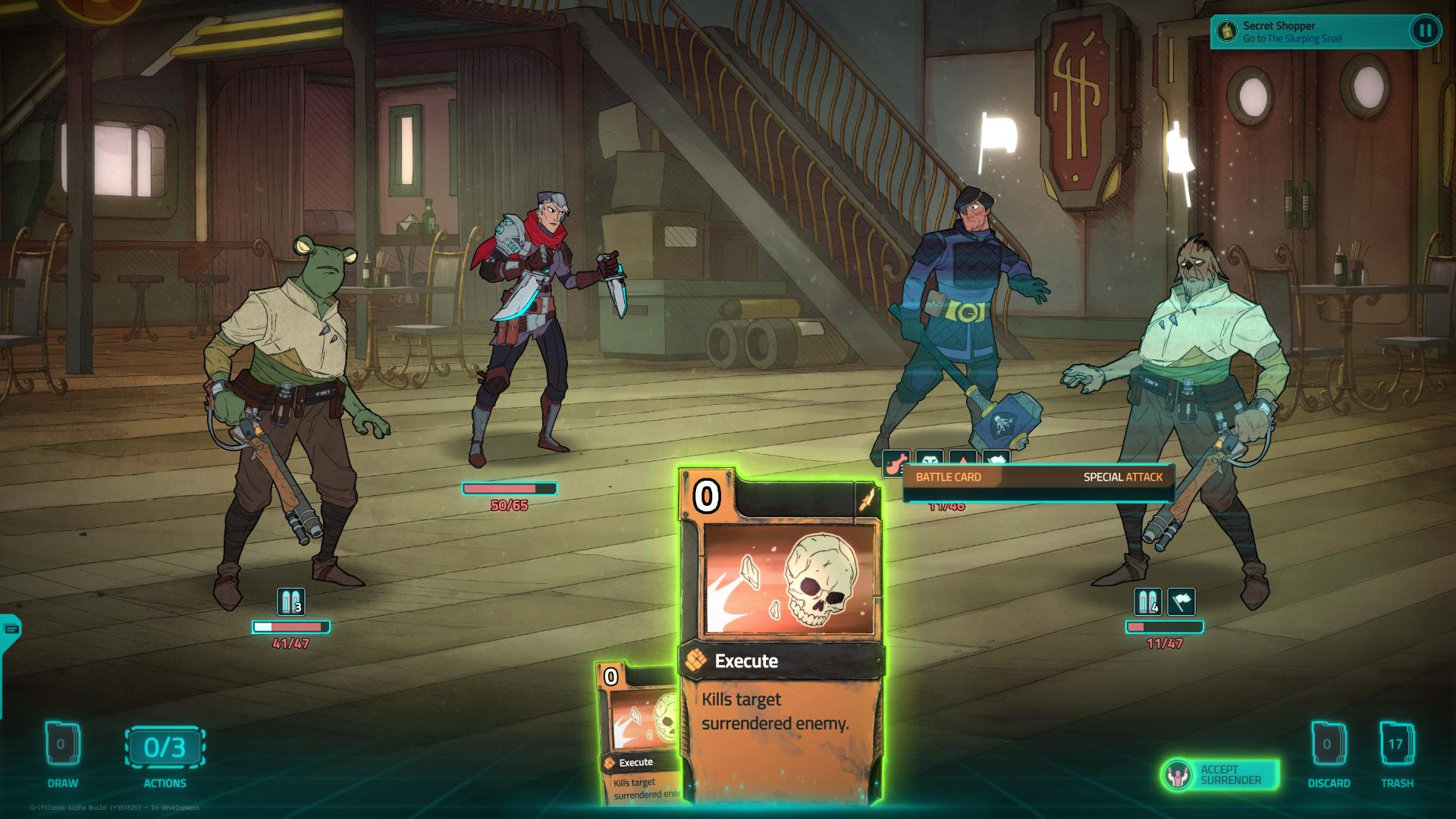
Except, on the final turn, two 0-cost cards appear in my hand labeled 'execute'. I can finish off these combatants or spare them. I choose to spare them, and Wrux hands over the package, though he isn't happy about it. I wonder what the consequence for killing him would be? His children swearing revenge? Cops on my tail?
That done, I return the package to the bandit and collect my pay. She's impressed, and now there's a third NPC who likes me more than they used to. I've made one enemy and three friends. The guard seems neutral—maybe he's too professional to have feelings. I still have an ulcer but I feel like I've come out ahead. That sense of decisions having consequences is one of the things that makes a good RPG, and Griftlands has it.
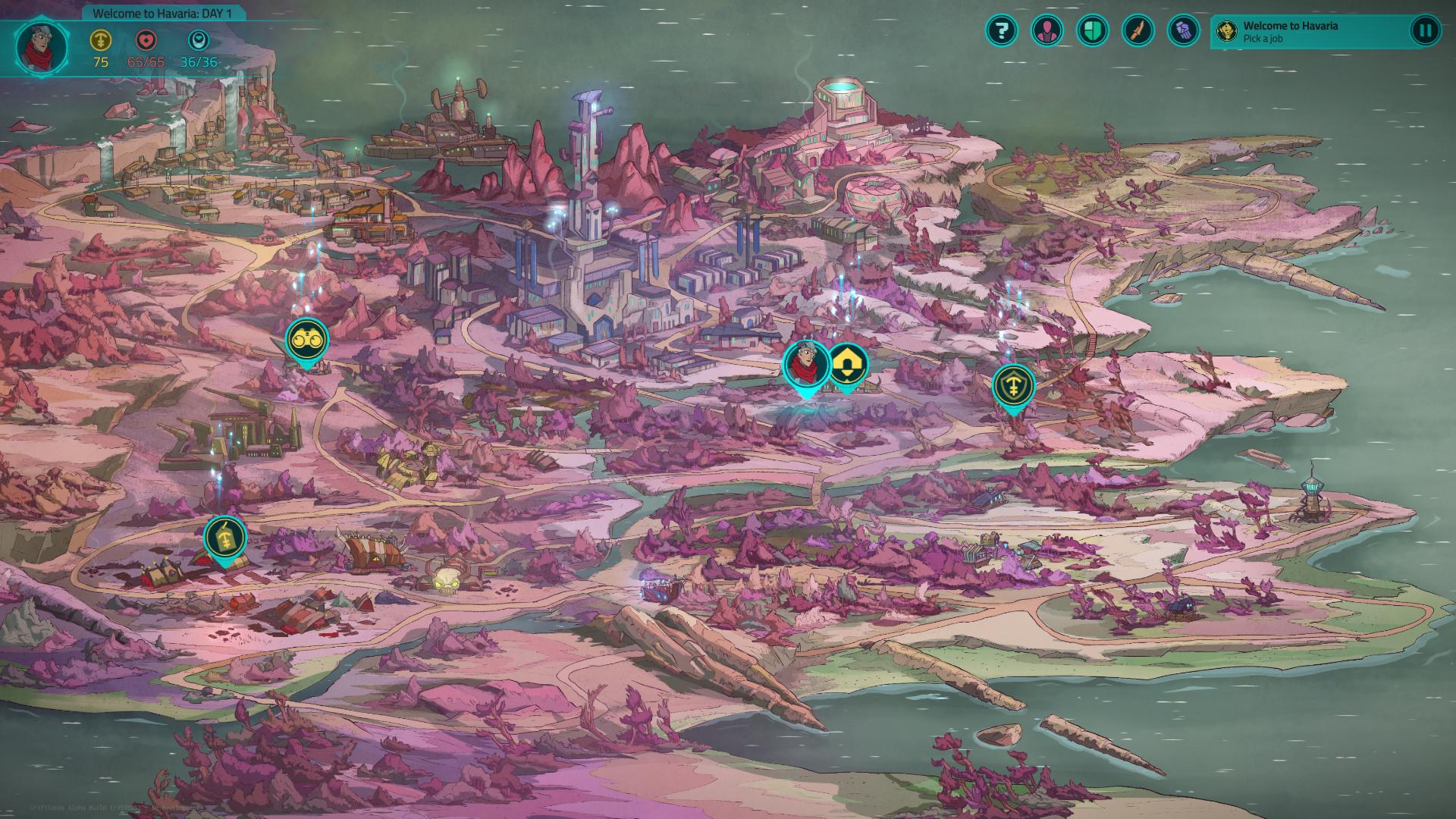
My first reaction to seeing what Griftlands had become was to be a little disappointed. An open-world RPG with its own economy and faction system lost, replaced by another deckbuilder. But I've played enough games that spread themselves thin just so they could justify putting the words "open world" in the description, or that had procedural elements but repeated them so often the new combinations were clearly Frankensteined out of the old.
I can't mourn the Griftlands we didn't get because I trust the people who made Don't Starve—one of about three survival games that don't suck—to know when a game is enjoyable and when it is not. The Griftlands we got is more like Card Hunter without the free-to-play cruft. It's not a revolution but it is a game that will help keep the urge to start playing Hearthstone on the regular at bay, like the Lord's prayer keeps away demons and sinful thoughts.
Griftlands is currently available in Early Access on Steam and the Epic Store.

Jody's first computer was a Commodore 64, so he remembers having to use a code wheel to play Pool of Radiance. A former music journalist who interviewed everyone from Giorgio Moroder to Trent Reznor, Jody also co-hosted Australia's first radio show about videogames, Zed Games. He's written for Rock Paper Shotgun, The Big Issue, GamesRadar, Zam, Glixel, Five Out of Ten Magazine, and Playboy.com, whose cheques with the bunny logo made for fun conversations at the bank. Jody's first article for PC Gamer was about the audio of Alien Isolation, published in 2015, and since then he's written about why Silent Hill belongs on PC, why Recettear: An Item Shop's Tale is the best fantasy shopkeeper tycoon game, and how weird Lost Ark can get. Jody edited PC Gamer Indie from 2017 to 2018, and he eventually lived up to his promise to play every Warhammer videogame.

